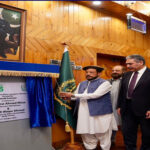Despite pressure from the Chinese government, Pakistan is unlikely to change the constitutional status of the Gilgit-Baltistan region, which is also claimed by India as part of the erstwhile state of Jammu and Kashmir. The reason is that it would encourage PoK to demand the same status and it will put India and Pakistan on a fresh collision course.
Previously, people in Pakistan were apprehensive about giving GB the full province status, as it would become the only province with Shia majority, while all other provinces are Sunni majority. Despite the still influential locals like Mirs and Rajas (similar to Nawab rulers, or Maharaja’s) executing instruments of accession, which are still pending acceptance, it is unlikely that the Pakistani state would accord GB a provisional status.
Gilgit-Baltistan region is neither a province of Pakistan nor part of the federation. It is a part of the erstwhile Jammu and Kashmir, which was divided between India and Pakistan, and is directly ruled from Islamabad, although it doesn’t enjoy the constitutional status similar to, for example, the Punjab province, which has representatives in the Pakistan parliament.
Reports of Pakistani establishment flirting with idea of changing the constitutional of GB came nine months after Pakistani Prime Minister Nawaz Sharif signed the CPEC agreement with Chinese premier Xi Jinping that would shorten Chinese’s road to Middle East and Central Asia by around 12,070 km and also bring an economic windfall in the form of oil and markets.
But if economics prevails over politics and Gilgit-Balistan gets an elevated status in Pakistan’s Constitution, it will also imply a tactical shift of the country’s traditional policy on Kashmir and ultimately pave way for the complete merger of the territory with Pakistan which will have a ripple effect on the Kashmir dispute.However, Director of New Delhi-based Institute of Peace and Conflict Studies, D Suba Chandran, told Firstpost it wouldn’t be easy for the mainstream in Pakistan to accord constitutional status of a province to Pakistan as it would become the only province with Shia majority, while all other provinces are Sunni majority.
“They need to have a debate in Parliament first. People have been and would be apprehensive about GB given the full province status. Second, it is for administrative reason; for example on issues of Indus water treaty, mainstream Pakistan has always been treating GB as a colony. If its status is increased, then they will have to be given equal rights like any other province of Pakistan. For that reason, Pakistan would think twice. If they are able to change its current status it won’t be, for sure, be a status of province,” Chandran, told Firstpost.
“There is consensus in both the areas (Gilgit Baltistan and ‘Azad Jammu Kashmir’) that they should be given rights equal to other provinces of Pakistan. However GB wants full fledged provincial status and Pakistani side of Kashmir wants rights equal to provinces without making it a province. My view is that both should be entered in the Constitution of Pakistan as special territories, with rights similar to other provinces without making them formally provinces,” he said.
But Justice Syed Manzoor Hussain Gilani, a former judge at the Supreme Court of “Azad Jammu and Kashmir,” points out to Firstpost via email that the reforms in the constitutional status have been a continuous process since 1975.
Gilani, who has been a vocal supporter of provincial status for PoK, says he wished that GB along with PoK would be granted a similar status without compromising “the basic stand on the Kashmir issue.”
If at all it happens, then the Pakistani government has to similarly and simultaneously accord the same status to PoK, so that there is no impression that Pakistan treats the two parts distinctively and on economic considerations. This is unlikely to happen, observers feel.
“Regulation of any part of state for administrative and economic purposes pending implementation of UN-resolutions is a step to afford local self determination and prosperity to these areas in the mainstream of the country.” Gilani adds.
After Kashmir got divided between India and Pakistan, both the countries have administrated the territories of the state under their control. But while Indian constitution provides for same rights to its citizens living in Kashmir in representative institutions, like any other state, Pakistan has avoided giving representation to people living on its side of Kashmir or Gilgit-Baltistan region in its institutions of governance.
Observers have argued in the past that justice and fair play also demand that people of these territories in PoK must not be kept hostage to a “resolution of state,” and that them being out of mainstream deprives them of governance and other issues.
Meanwhile, the move has created a flutter in the divided parts of Kashmir. Last Saturday, the Pakistan occupied Kashmir government declared that it will oppose and protest any move to convert Gilgit-Baltistan into a province of Pakistan.
In Srinagar, JKLF chief, Mohammad Yasin Malik, unveiled an open letter to the Pakistan Prime Minister Nawaz Sharif, noting that any move to change the constitutional status of GB will amount to “backstabbing” the sentiments of people who have died in Kashmir conflict.
Clearly, the last word on the issue has not been spoken yet.
firstpost
























